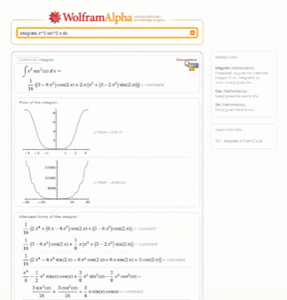Earlier this year at the SemTech conference in San Jose, I sat down with Wolfram|Alpha‘s Russell Foltz-Smith. Wolfram|Alpha bills itself as a “computational knowledge engine,” a nerdy and unfortunately not very intuitive description. Because it’s hard to grok, most people have categorized Wolfram|Alpha as a new type of search engine. The site got a lot of press when it launched in May, as many pundits saw it as a challenger to Google. However in our own extensive tests of the product before launch, we concluded that it isn’t a “Google Killer” and that it has more in common with Wikipedia.

Even now there is still confusion about what Wolfram|Alpha is and what its main use cases will be. In this interview with Russell Foltz-Smith, we discuss what people are using Wolfram|Alpha for now; and more importantly what its uses will be in the near future.

Editor’s note: This story is part of a series we call Redux, where we’ll re-publish some of our best posts of 2009. As we look back at the year – and ahead to what next year holds – we think these are the stories that deserve a second glance. It’s not just a best-of list, it’s also a collection of posts that examine the fundamental issues that continue to shape the Web. We hope you enjoy reading them again and we look forward to bringing you more Web products and trends analysis in 2010. Happy holidays from Team ReadWriteWeb!
Wolfram|Alpha: What is it Good For?
Wolfram|Alpha is a product that was built on top of founder Stephen Wolfram’s Mathematica product, a software tool for mathematicians that was initially released in 1988. The aim is to allow users to type human-like statements and have computations done on those. Wolfram|Alpha was first conceived and started development about 4 years ago, and just 6-8 months ago the team gave serious consideration to taking the product to a wider consumer audience.

I started out by asking Foltz-Smith what the Wolfram|Alpha team thought of all the media hype around their product, particularly about the “Google Killer” theme which many media outlets reveled in. Foltz-Smith replied that they were expecting to be compared to Google, but not to that extent. Their team was a little surprised there wasn’t more discussion around Wolfram|Alpha’s similarities to Wikipedia and Freebase (although he noted that ReadWriteWeb certainly covered that!). Regarding the Google comparisons, Foltz-Smith said that they didn’t give into the hype – they stuck to what their goals were.
I remarked that many people still seem confused about what Wolfram|Alpha does and what it can be used for. Foltz-Smith said that people will use it for different things. The crux of the product though is that it allows people to compute and calculate things.
But will mainstream people use Wolfram|Alpha? Right now, it seems to be focused on mathematicians. Foltz-Smith replied that yes, eventually Wolfram|Alpha will find a mainstream audience. It has started specific, but it will go broader. First, he said, it has to “pass a test” with “serious users” – by which he means academics and computational users. If it’s useful for them, claimed Foltz-Smith, it will then go mainstream.
Use Case: Education
One real-world use case we talked about was using Wolfram|Alpha in education. Russell Foltz-Smith said that Wolfram|Alpha could be used to automatically generate problem sets for students, and then research those sets.
A recent article in education website Chronicle.com argued that Wolfram|Alpha may have a less desired effect: encouraging cheating and laziness in students. This is because Wolfram|Alpha not only solves complex math problems, it “also can spell out the steps leading to those solutions.”

Stephen Wolfram told Chronicle.com that computer-algebra systems like Wolfram|Alpha actually improve education – because they allow students to explore complex problems on their own and intuitively determine how functions work, rather than just learn rote processes. Wolfram claimed that “it’s better to let them [students] stand on that platform and go further.”
Either way, it’s clear that Wolfram|Alpha and similar computational software will force the education system to adapt and change. Students now have a new (and certainly easier to use, as it’s on the Web) platform on which to compute things. There’s no point in the education system pretending it doesn’t exist. If you’re interested in tracking the progress of Wolfram|Alpha in educational settings, there is a wiki devoted to ‘Teaching Undergraduate Math with Wolfram|Alpha.’
Use Case: Computational Journalism
This one was described to me as “anomaly spotting.” For example with the current interest in swine flu news, Wolfram|Alpha could be used to fact-find and compute interesting trends. As Foltz-Smith described it, Wolfram|Alpha could “automatically enhance news.”
Foltz-Smith noted that CNN and other major networks do this already (analyze data), but that it’s expensive to do. The end results on CNN are added value things like interactive maps and fancy diagrams. Wolfram|Alpha could make this type of data gathering and analysis presentation inexpensive and common place amongst all kinds of news operations – including good old blogs.
Use Case: Sports Watching
Imagine sitting in your sofa in the lounge, remote control in one hand and your favorite beverage in the other. You’re watching the Friday night game on TV, it’s a close game and you’re curious about which team has the better chance of winning. Why, check Wolfram|Alpha of course! In real time, Wolfram|Alpha could compute statistics about not just the history of the two teams – but the history of the location of the game, the weather, the season so far, etc.
As Foltz-Smith explained it, Wolfram|Alpha would be able to do “chained queries” – queries made up of multiple parts. For example: which quarterback had the best winning record in games played in the rain during the 1970s.

Other Use Cases
We also discussed medical and scientific use cases. Although there are early examples of Wolfram|Alpha in health, such as a nutrition label generator, Foltz-Smith was generally cautious about medical uses – because a lot of health data “can’t be wrong.” He noted that in use cases like medical research, the issue of data fidelity is key. For example with the human genome, you have to take great care of that data and associated algorithms. Also he explained that as something like the human genome scales, how do you do QA?
Foltz-Smith admitted that the Wolfram|Alpha team is still working on these and similar issues. But they have a lot of people devoted to solving this problem. Some types of data could be crowdsourced, e.g. in linguistics, but other data needs different approaches.
Conclusion
It was interesting to hear about some of the potential uses of Wolfram|Alpha. We at ReadWriteWeb think this product has a promising future. If Web 2.0 was about creating data (user generated content, to use the most familiar term for this), then the next generation of the Web is all about using that data. Wolfram|Alpha is premised on using and computing data.
Let us know in the comments what use cases you see for Wolfram|Alpha, and whether you’re aware of similar computational web apps.
See also:
















